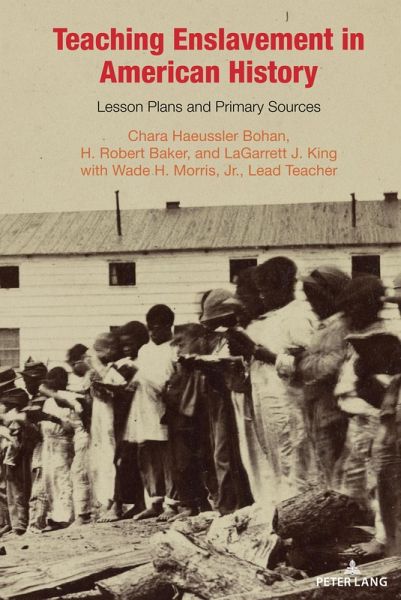
Teaching Enslavement in American History (eBook, PDF)
Lesson Plans and Primary Sources
Versandkostenfrei!
Sofort per Download lieferbar
Statt: 42,95 €**
35,95 €
inkl. MwSt.
**Preis der gedruckten Ausgabe (Broschiertes Buch)
Alle Infos zum eBook verschenkenWeitere Ausgaben:

PAYBACK Punkte
18 °P sammeln!
Teaching Enslavement in American History provides classroom teachers with the resources necessary to navigate one of the most difficult topics in any history course. This volume is the product of a collaboration between three university professors and a team of experienced middle and high school teachers. Its nine chapters include the context for topics like the middle passage, the Constitution's position on enslavement, African cultural retention, and resistance to enslavement. The resources include 18 lesson plans and dozens of short primary and secondary sources modeled on document-based qu...
Teaching Enslavement in American History provides classroom teachers with the resources necessary to navigate one of the most difficult topics in any history course. This volume is the product of a collaboration between three university professors and a team of experienced middle and high school teachers. Its nine chapters include the context for topics like the middle passage, the Constitution's position on enslavement, African cultural retention, and resistance to enslavement. The resources include 18 lesson plans and dozens of short primary and secondary sources modeled on document-based questions and the inquiry design model.
Real teaching requires courage, a deep understanding of the complexity of the subject matter, and skillful use of primary sources. Rather than teaching students what to think, Teaching Enslavement in American History pushes students to learn how to think: empirical argumentation, source evaluation, understanding of change-over-time, and analysis of historical context. The lessons in this book ask students to read, analyze, and contextualize a variety of primary sources, to identify the limitations of these sources and to articulate historical contradiction where it occurs. At the heart of this book is the belief that historical consciousness leads to societal change. Teaching about enslavement is not merely about teaching a curriculum, it is about molding citizens who will lead our democracy in its journey to become a more perfect union.
Real teaching requires courage, a deep understanding of the complexity of the subject matter, and skillful use of primary sources. Rather than teaching students what to think, Teaching Enslavement in American History pushes students to learn how to think: empirical argumentation, source evaluation, understanding of change-over-time, and analysis of historical context. The lessons in this book ask students to read, analyze, and contextualize a variety of primary sources, to identify the limitations of these sources and to articulate historical contradiction where it occurs. At the heart of this book is the belief that historical consciousness leads to societal change. Teaching about enslavement is not merely about teaching a curriculum, it is about molding citizens who will lead our democracy in its journey to become a more perfect union.
Dieser Download kann aus rechtlichen Gründen nur mit Rechnungsadresse in A, D ausgeliefert werden.



